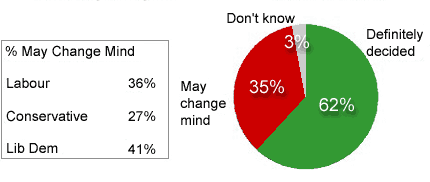Worcester's Weblog

MORI chairman Sir Robert Worcester analyses the latest opinion poll data.
Labour (on a uniform swing nationwide) would have their 2001 158 seat majority over all other parties cut nearly in half, to 84 seats on a 61 per cent turnout, whereas if all voted, they would be close to their 2001 landslide, according to the latest MORI poll for the Financial Times, carried out April 21 to 25 among a huge sample of 2,256 electors interviewed in home, in person, in 200 sampling points throughout the nation. This is the largest sample, and only the second face-to-face poll reported so far in this election, among the nearly 40 polls so far released.
Especially coming after yesterday's 10 point Labour lead by NOP in the Independent, the 10 point lead in the Populus tracker and the six point lead in the ICM poll in the Mirror/GMTV (although rumour has it that among those absolutely certain to vote there is a Tory lead), these findings give the Conservatives hope that their day may yet come, and will depress the Labour leadership, especially Mr Blair who is hoping for a decisive third Labour landslide.
Key to the turnaround is that in this poll eight in 10 Conservatives say they are 'absolutely certain to vote', but only two in three, 64 per cent, of Labour supporters are equally sure, as are nearly three in four, 73 per cent, of Liberal Democrats -- a 'certainty gap' of 16 points, nearly the width of the results from our pre-election poll result for the FT carried out immediately before the prime minister called the election on April 5 for the following May 5 election day.
Eight In Ten Tories 'Certain To Vote'
Q And how likely will you be to vote in the General Election, on a scale of 1 to 10, where 10 means you would be absolutely certain to vote, and 1 means that you would be absolutely certain not to vote?
Base: 1,106 British adults 18+, 21-25 April 2005
| 160 | % |
|---|---|
| Conservative | 80 |
| Labour | 64 |
| Liberal Democrats | 73 |
Of those now confirming they intend to support Labour on election day, over a third are still 'floating', saying to us that while it is their intention, they still may change their mind in the final week. Among Conservatives, those who may change their mind are just over a quarter, 27 per cent, and Liberal Democratic support is the shakiest of all, with four in 10 intending to vote for them saying they may change their mind.
May Change Mind
Q Have you definitely decided to vote for the ... party or is there a chance you may change your mind before you vote? Base: 1,742 British adults 18+ naming a party, 21-25 April 2005

The substantial sample size in this survey enables us to examine the electorate in the marginals, to test the spin that Liam Fox has spun naпve journos that while the national polls may show a large Labour lead, the election is much closer in the marginals.
Even the one-man poll reported nightly by Andrew Marr has been taken in by this, saying that as he goes around in the marginals, it is 'very, very close'. Well Andrew, that's why they're called marginals, isn't it?
Two things seem to be happening in the marginals. First, the Liberal Democrats are doing much better than they were in 2001 in the Labour-Conservative marginals, likely the elusive Iraq war effect. They may even take a few seats from Labour, although their potential is nearly four times as great in the Con-Lab marginals as in the Lab-Con ones.
Second, the Tories' 840,000 voters in marginal seats tactic seems to be working; they are doing better in the 10 to 20 per cent Labour lead in 2001 marginals than in the zero to 10 per cent ones, as they may well be concentrating their firepower in those marginals beyond the ones that they could expect to win comfortably from a minimum swing to them from Labour anyway.
If this pattern holds until election day, it might mean some surprise results, Labour holding on to some of its most vulnerable seats high up on Peter Snow's red panels, yet seeing some that look much further down turn blue as they fall to the Tories.



